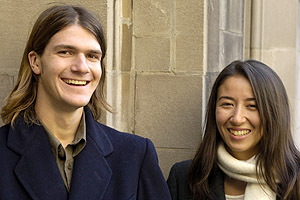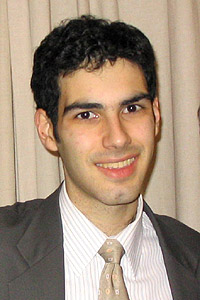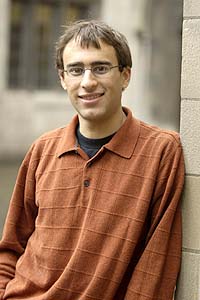Young scholars off to study at Oxford, Bristol
By Kim DixonNews Office
 Nicholas Juravich and Maria Cecire  Samsher Gill | |
One student spent 10 weeks chronicling human rights abuses in South Africa; another seeks to forge new ground applying political philosophy to the intellectually disabled; a third aims to spark children’s learning with medieval literature.
The three, Nicholas Juravich and Maria Cecire, fourth-years in the College, and Samsher Gill, a 2005 graduate, have won the renowned Rhodes scholarships for study in Britain.
While still in high school, Stephen Brusatte’s fascination with dinosaurs and a driver’s license jump-started his career studying fossils. Brusatte, who began his earliest fieldwork driving the farmlands of northern Illinois detailing 300 million-year-old fossils, has won a prestigious British Marshall Scholarship.
It is the fourth time in a decade that multiple University students have received the Rhodes scholarship, bringing Chicago’s total number of scholars to 42. The scholarships were established in the will of British colonial pioneer and statesman Cecil J. Rhodes and were initiated upon his death in 1902. The award provides tuition and a living stipend to 32 Americans for two years of study in any field at the University of Oxford.
The Marshall Scholarship was founded by a 1953 Act of Parliament to celebrate the humane ideals of the Marshall Plan, the U.S. effort to rebuild Europe after World War II.
Brusatte’s Marshall award brings the University’s total number of recipients to 18.
“This is one more truly powerful example of what can happen when we recruit students of very high quality, provide them with a challenging Chicago liberal arts education, and support them in all ways possible,” said John Boyer, Dean of the College and the Martin A. Ryerson Distinguished Service Professor in History.
Brusatte, 21, plans to build upon his undergraduate work in Geophysical Sciences by tracking the evolution of five rare specimens of theropods—or predatory dinosaurs—housed in British museums. The Ottawa, Ill. native has marveled at dinosaurs since he was a kid, began his own magazine column on state fossils while in high school, and had his first book published before entering the University in 2002.
“He is a self-made individual who is just passionately following something he always loved,” said Paul Sereno, Professor in Organismal Biology & Anatomy and world renowned for his dinosaur discoveries. “I didn’t have that singular idea of what I wanted to become” that early on.
Brusatte has known Sereno since he was a sophomore in high school, when he wrote to the professor whose fossil findings “seemed to grace the pages of the Chicago Tribune weekly,” he said. Two years later, he enrolled at the University, and soon after that began examining specimens in the lab.
 Stephen Brusatte | |
He was elected a Student Marshal, the highest academic honor the University endows on undergraduates. He has been on the Dean’s list for the past three years, and is the winner of the John Crerar Foundation Science Writing Prize and the Howard Hughes Institute Undergraduate Research Fellowship.
In Britain, Brusatte will study at the University of Bristol and Imperial College. Ultimately, he plans to pursue a Ph.D. in geology or evolutionary biology.
Maria Cecire, 22, said the freedoms and trust her parents granted her to explore her passion—allowing her to stay up late for theatre, for example—unleashed her creative spirit early on. That independence led her at age 16 to lobby her parents to allow her to live and study abroad in Norway, and to take a year off between high school and college to teach English in Japan. “I embarked on all kinds of trials of my parents’ trust,” Cecire said.
Fascinated by what sparks children’s curiosity to learn, she now will get to combine her creative and academic passions studying English medieval studies at Oxford.
“I want to study medieval literature and research how it is connected to the books for young people that emulate it today,” she told the Rhodes committee.
Through her job as a docent at the Smart Museum of Art, she discovered the power of art to engage underserved children in learning. She wants to explore the connections she sees between medieval literature and contemporary children’s stories, and eventually open a charter school for low-achieving or otherwise underprivileged students.
“Maria is a fine student as well as a talented documentary filmmaker. Among her achievements so far is a film in which she movingly documents the idealism and dedication with which Zambian science teachers make do with practically nothing,” said Christina von Nolcken, Associate Professor in English Language & Literature and the College.
The Newport News, Va. native was named a Student Marshal and was president of Fire Escape Films, a student-run film group, where she has been active for several years as a filmmaker and advisor.
Nicholas Juravich’s worldview took shape during training runs down Drexel Avenue in Hyde Park. As captain of the Maroons cross-country team, Juravich witnessed a stark contrast in the neighborhood between the stately University campus at one end and dilapidated housing projects at the other.
During these runs, the Amherst, Mass. native saw the diverse route as “a crash course in the social, economic, and racial inequality and injustice that haunt American cities and the world at large,” Juravich said.
To delve into the context of these injustices, he majored in History, and during his second year in the College, he went to South Africa where he cataloged for a local agency forced evictions among the poor. That experience led him to take a job with the University’s Human Rights Program.
“Nick is a true Renaissance man: scholar, athlete and committed human rights activist,” said George Chauncey, Professor in History and the College and Juravich’s course advisor.
While in Britain, Juravich plans to pursue a Master of Philosophy in Social and Economic History at Oxford, and he eventually plans to obtain a Ph.D. in American History. He has made the Dean’s list for the past three years, and the 21-year-old was elected a Class of 2006 Student Marshal.
Samsher Gill, 22, arrived at the University expecting to trace his mother’s footsteps by preparing for law school. Instead, he felt drawn to political theory, fueled by the injustices he saw between the relative ease he had achieving his goals, compared with his older brother’s struggle with Down’s syndrome.
Gill, whose father was born in India, began to see political theory’s mismatch with reality: “While it addressed someone like my father or mother—differentiated through race, ethnicity or gender—where was the rigorous theory aimed at opening society to people with intellectual disabilities?” Gill posed to the Rhodes scholarship committee.
He has worked both at Mental Disability Rights International and at the Robert F. Kennedy Memorial Center for Human Rights. The former group argues that mental disability rights have been left out of most human rights activism. In that vein, Gill helped start a project attempting to link intellectual disability to the right to health at the Kennedy center.
Raised in Edina, Minn., Gill has spent time studying in both Berlin and Paris. He was elected Phi Beta Kappa during his third year and also was elected as a 2006 Student Marshal.
Martha Nussbaum, the Ernst Freund Distinguished Service Professor of Law & Ethics in the Law School, Philosophy and the Divinity School, and the College, admitted Gill to her Feminist Philosophy class as an undergraduate, an unusual allowance.
“His unusual seriousness of purpose led me to admit him, and I was not disappointed,” she said. He shows a “clarity and subtlety of understanding and an ability to grapple with the complexities of texts, all way beyond his years.”
![[Chronicle]](/images/sidebar_header_oct06.gif)